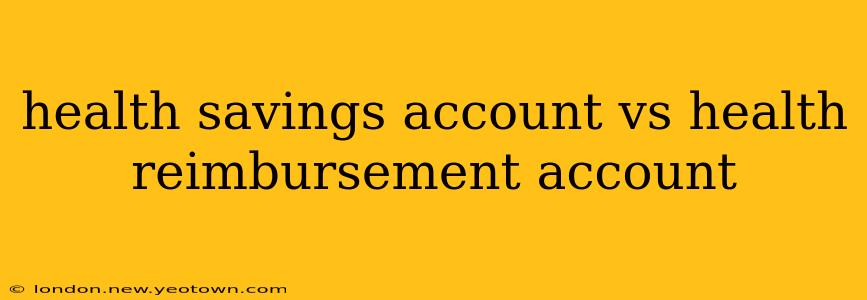Choosing the right health savings plan can feel like navigating a maze. Two popular options often leave employees scratching their heads: the Health Savings Account (HSA) and the Health Reimbursement Account (HRA). Both offer tax advantages, but their structures and benefits differ significantly. Let's unravel the mystery, starting with a relatable story.
Imagine Sarah, a freelance graphic designer, and Mark, a software engineer at a large corporation. Both are looking for ways to manage their healthcare costs effectively. Sarah, with a high-deductible health plan, opts for an HSA. Mark, on the other hand, benefits from his employer's HRA, coupled with a more comprehensive health insurance plan. Their journeys highlight the key distinctions between these two accounts.
What is a Health Savings Account (HSA)?
Sarah chose an HSA because it offered her a powerful tool to save for healthcare expenses and grow her savings tax-free. HSAs are individual accounts that work alongside high-deductible health plans (HDHPs). This means you pay a higher deductible before your insurance kicks in, but the premiums for the HDHP are generally lower.
Key features of an HSA:
- Triple tax advantage: Contributions are tax-deductible, earnings grow tax-free, and withdrawals for qualified medical expenses are tax-free.
- Ownership: You own the money in your HSA. It stays with you even if you change jobs or insurance plans.
- Rollover: Unused funds roll over year to year, growing your savings for future healthcare needs.
- Investment Options: Many HSAs offer investment options, allowing your money to grow beyond simple interest.
What is a Health Reimbursement Account (HRA)?
Mark's employer-sponsored HRA provided a different approach to healthcare cost management. HRAs are funded either entirely or partially by employers, and are used to reimburse employees for eligible medical expenses.
Key features of an HRA:
- Employer-funded: The employer typically contributes to the HRA, and the employee doesn't directly contribute.
- Reimbursement: You receive reimbursement for eligible medical expenses, usually after submitting receipts.
- Limited portability: HRAs are often tied to your employment. If you leave your job, you may lose access to the remaining funds in your account (although some plans offer a grace period).
- No investment options: HRAs generally do not offer investment options.
HSA vs. HRA: A Side-by-Side Comparison
| Feature | HSA | HRA |
|---|---|---|
| Funding | Employee contributions | Employer contributions |
| Ownership | Employee | Employer |
| Portability | High | Low |
| Investment Options | Often available | Typically not available |
| Tax Advantages | Triple tax advantage (contributions, earnings, withdrawals) | Tax-free reimbursements for qualified expenses |
| Health Plan | High-deductible health plan (HDHP) required | Can be paired with various health plans |
What are the eligibility requirements for an HSA?
To be eligible for an HSA, you must be covered by a high-deductible health plan (HDHP) that meets specific IRS requirements. You also cannot be enrolled in other health coverage, such as Medicare or Medicaid. There are also contribution limits that change yearly.
Can I contribute to both an HSA and an HRA?
Generally, you cannot contribute to both an HSA and an HRA simultaneously, unless it is a limited purpose HRA (LPHA). LPAs cover only certain expenses, like vision or dental, and don't affect HSA eligibility. This is a complex area, so it's important to understand your specific plan details.
How do I choose between an HSA and an HRA?
The best option depends on your individual circumstances and preferences. Consider these factors:
- Your health insurance plan: Do you have a high-deductible health plan?
- Your health spending habits: Do you anticipate significant medical expenses?
- Your employer's benefits: Does your employer offer an HRA?
- Your long-term financial goals: Are you interested in investing your healthcare savings?
For those comfortable with higher deductibles and long-term savings, HSAs provide a powerful financial tool. For those who prefer predictable out-of-pocket costs, HRAs offer a simpler and more straightforward approach.
Conclusion
Ultimately, the decision between an HSA and an HRA hinges on your specific needs and the level of control you desire over your healthcare savings. Understanding the key differences between these two accounts empowers you to make informed choices that best serve your financial well-being. Remember to consult with a financial advisor or your HR department for personalized guidance.

